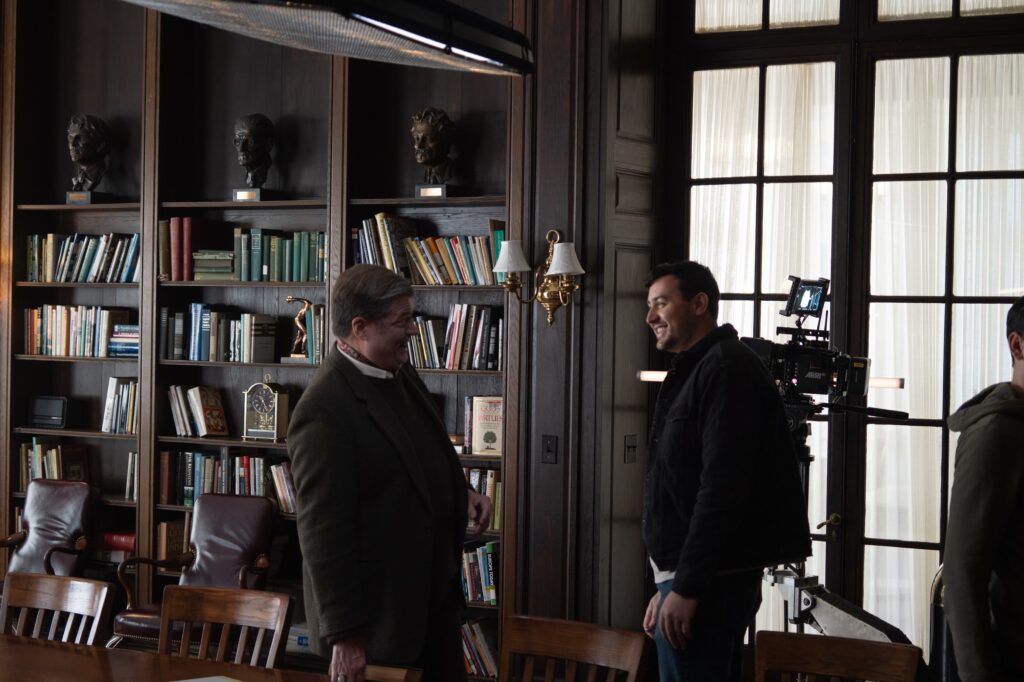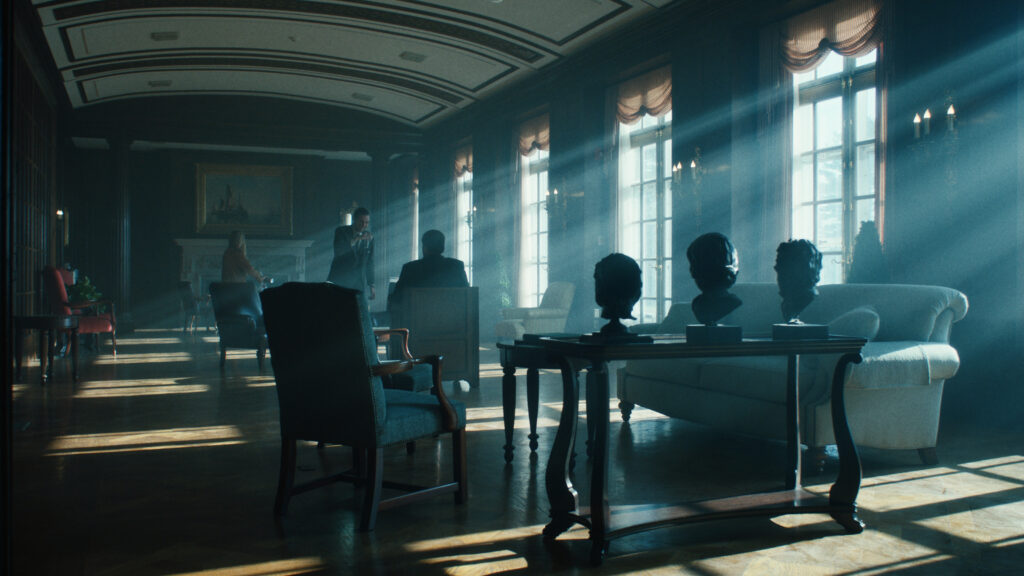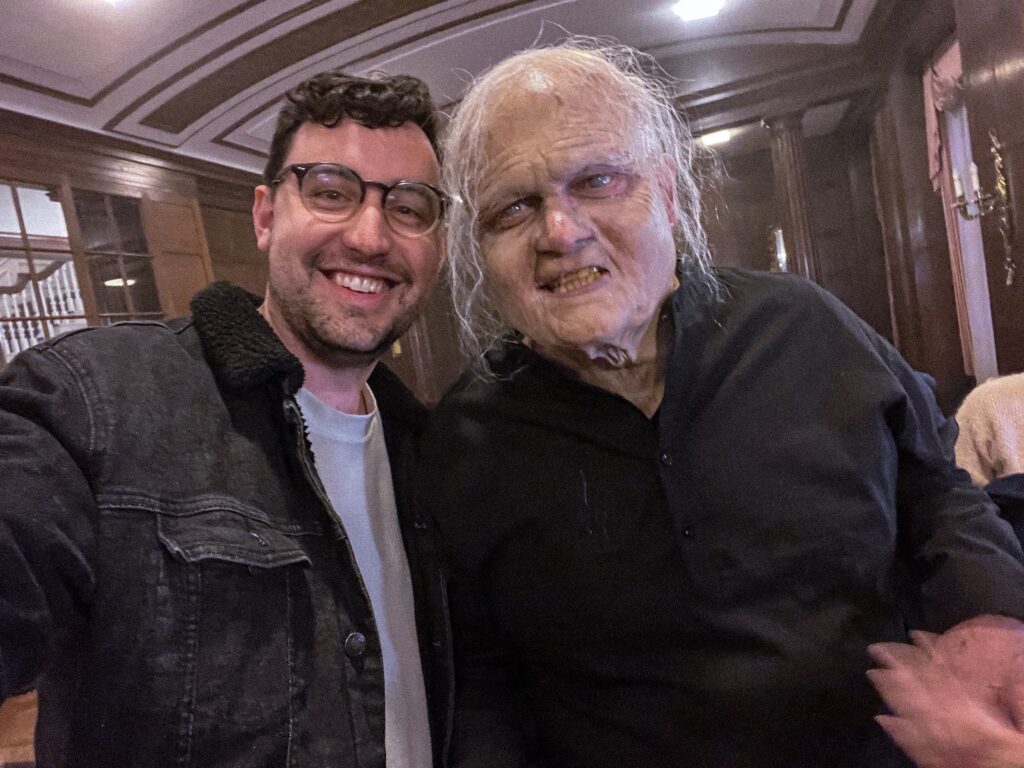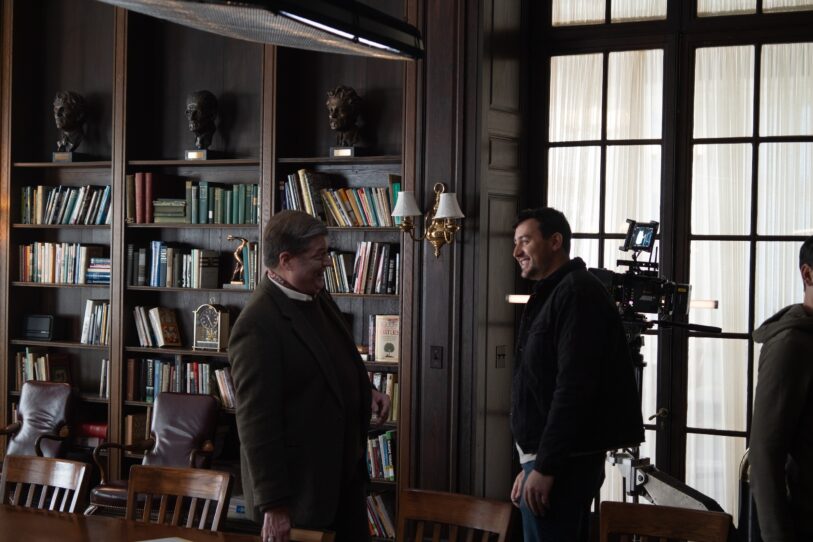Supplement to Hamptonia Fall 2024.
FROM HIS BEGINNINGS in a small New Hampshire town to winning acclaim at international film festivals, Conor Soucy, New Hampton School Class of 2015, has established himself as a rising filmmaker with a unique vision. In works that span dramatic storytelling, psychological horror, and a deep exploration of grief and trauma, Soucy pushes boundaries while staying true to his roots. Read the full article in Hamptonia, arriving in December 2024. Images courtesy of Conor Soucy and Howlin’ Hounds Pictures. Interview from June 2024.
Background and Inspiration
Can you tell us a bit about your background and what inspired you to become a filmmaker?
I’ve always been passionate about movies. Growing up in a small town in New Hampshire, there wasn’t much to do, so going to the movies with my dad was always a special event. We come from a family of movie enthusiasts, and the excitement of the theater experience really resonated with me.
Who are some of your biggest influences in filmmaking, and how have they shaped your style and approach?
Initially, my film influences were the big blockbusters like ‘Star Wars,’ Richard Donner’s ‘Superman,’ and ‘The Goonies.’ However, as I delved deeper into my filmmaking career, my tastes evolved. ‘The Conversation’ starring Gene Hackman became a pivotal influence, sparking my appreciation for the subjective style of filmmaking. In ‘The Conversation,’ the audience experiences the story from Hackman’s perspective, knowing only what he knows. Masters like Polanski, Coppola, and Hitchcock have excelled in this technique. Inspired by them, I aim to adopt this immersive, protagonist-centered approach in my first three films.

Recent Success
Congratulations on winning an award at the Cinequest San Jose Film Festival! How does it feel to receive such recognition?
It feels great. Filmmaking is all about collaboration, and when you have actors, composers, and cinematographers investing their time and efforts, taking a leap of faith on a project, you really want it to pan out. Having that unified vision recognized is incredibly rewarding..
Can you tell us about Dead Whisper? What inspired its story, and what message were you hoping to convey?
My feature debut, Dead Whisper, will be in select theaters on July 5, and on Demand everywhere including AppleTV, Prime Video, and more on July 9. The film follows Elliot Campbell, a Cape Cod lawyer lured to a mysterious island where he’s tempted by a reunion with his dead daughter, but at the peril of his soul. The core message of the film is that grief is an island that can trap you… if you’re not careful.
What were some of the biggest challenges you faced during the production of this film, and how did you overcome them?
Dead Whisper was originally a short film. Some incredible people who loved the short wanted to see it become a feature and invested in it. Instead of starting from scratch, I chose to use all the funds for new material. So, the original 20-minute short is scattered throughout the feature film—at the beginning, middle, and end. This created a big challenge with continuity and storytelling. I think we nailed it, but I encourage anyone to see if they can spot the time jumps.

Filmmaking Process
How do you typically approach a new project? Can you walk us through your process from idea conception to final cut?
I believe that entire stories can unfold from a single moment. For instance, ‘Dead Whisper’ was inspired by a vivid dream, where I woke up on an empty five-story ferry in the middle of the ocean, with no captain, and a strong feeling that I wasn’t heading to Nantucket. That dream was the genesis of the movie, and throughout the filmmaking process, our goal was to capture the essence of that moment.
What do you look for in a script, and how do you decide which projects to pursue?
I prefer making small movies that pack big ideas, rather than big movies with small ideas. The most creative ideas come when you’re boxed in. Even the smallest moments can become monumental when the story is right. That’s why I gravitate towards stories that are character-driven.
How do you collaborate with your team to bring your vision to life?
Everything kicks off with discussions about the script and the emotional impact we want the audience to feel. After spending a year or two developing a screenplay, it’s tough to let go, but giving your team creative liberty is key. I want my collaborators to tell me how they envision the film’s sound and visuals because they’re the experts. Then, when the music hits just right or the visuals are stunning, I get to take all the credit—of course, that’s just a joke. But really, I view directing more as facilitating a vision.
On Dead Whisper, I got to work with Broadway legend Rob Evan. Our conversations are not about the delivery of words, but about the intention behind them. Character motivations. With Rob, he immediately got the material, and our conversations were in an abstract territory that I think led to an amazing first on screen performance.

Career Development
How has your filmmaking style evolved since you started, and what have been some key learning moments?
I’m sure I was a terrible director when I started. It was a period of exploration and making mistakes. From that, I found my voice. I learned when I should be the storyteller and when it’s better to let someone else take the lead. People might not realize how many bad projects you work on when trying to be a filmmaker; it’s almost comical. But I’ve come back to that place where making movies feels like when I was making movies with my friends as kids. That’s a crucial place to be because it’s exactly why I started making films.
How do you balance creative vision with practical constraints, such as budget and time?
I see constraints as a chance to get creative, which ties back to my point about thriving ‘in a box.’ Filmmaking is really a game of time management. For Dead Whisper, I worked closely with the Assistant Director and Department Heads to meticulously plan our schedule, right down to the minute. This way, I knew exactly how long we had for each shot and how many takes we could manage within the scene’s duration. If we went off schedule by even 45 minutes, it would cost us about three shots. Watching the movie now, I can still pinpoint the shots we missed.

Future Aspirations
What types of stories are you most passionate about telling, and why?
Currently, I’m working on what I call the ‘ferry trilogy.’ Dead Whisper is the first movie in that trilogy. These stories and IPs are unrelated, but they share horror themes, subjective protagonists, and a deep exploration of trauma. As a fun element, each film will feature a ferry. I’m drawn to exploring the darker aspects of storytelling to shed light on life’s brighter sides. At 27, I’m doing a lot of looking back before moving forward into the big life changes that can come with starting a family. So I want to tell stories that explore crossroads, and the emotional roadblocks that keep us where we are.
Are there any particular genres or themes you haven’t explored but would like to in the future?
On Dead Whisper, I dipped my toes into the horror genre. Now, I’m aiming to give Fear the Tall Branches a true horror feel with a blockbuster edge. Despite my current focus on horror, my roots are in dramatic writing, and I plan to return to that once I’ve explored the horror genre sufficiently. I’m particularly interested in period dramas set in New England. In fact, I’ve been developing a drama/thriller story set in New Hampshire that I’ve been holding onto for years.
What upcoming projects are you most excited about, such as Circles, and what can you tell us about them?
Actually, Circles has been renamed to Fear the Tall Branches. It’s about Emma, a woman with psychic visions who returns to Forks, Washington, to confront the monster that haunted her childhood. We’re currently in the financing stage and making great progress. I’m collaborating again with Samuel Dunning on the screenplay. He’s having a breakout year. He was the lead in Dead Whisper and will also star in Tim Travers and the Time Travelers Paradox alongside some big names.

Industry Insights
How do you see the film industry evolving in the next few years, and what role do you hope to play in that future?
Consumers have grown accustomed to unrealistic pricing for their content. The $20-a-month model for access to thousands of titles isn’t sustainable, which is why we’re seeing commercials and advertisements creeping into streaming services. Additionally, many current shows and films carry a corporate feel that’s turning off audiences. I believe this will drive a resurgence in theater attendance, particularly for independent cinema. The success of Dead Whisper is paving the way for our team to have more opportunities to entertain audiences.
What advice would you give to aspiring filmmakers who are just starting out?
Eric Edison emphasizes in his book ‘The Story Solution’ that people go to the movies to feel deeply. That’s always a good starting point for any story. In today’s world, where creating content has become more accessible than ever, it’s crucial to write from the heart and write what you know. The first act of Fear the Tall Branches draws from my own memories of growing up in northern New Hampshire. It’s fascinating how personal experiences, though specific, can universally resonate with audiences.
How important is it for filmmakers to stay adaptable and open to new technologies and trends in the industry?
It’s incredibly important to stay informed about AI, which is sparking a lot of discussions and raising numerous ethical concerns. Those of us in the entertainment industry need to deeply understand this technology and its associated challenges. The conversation about AI’s role and its ethical use is ongoing. While I appreciate how AI could simplify filmmaking, my priority is to protect artists’ work. I suspect that copyright infringement, especially in relation to AI, will become a major topic of philosophical and legal debate.

Personal Reflections
What has been the most rewarding moment of your career so far?
There’s a scene in Dead Whisper that a lot of people love. Everything just clicked on set—the performance, lighting, dialogue—and the music added later made it even stronger. There was a real sense of ‘knowing’ that we had nailed a great scene. I think I’ll be chasing that feeling for the rest of my career.
What is the origin of the Howlin’ Hounds Pictures name?
I founded Howlin’ Hounds Pictures with cinematographer Ben Grant and composer Nikhil Koparkar. Both Ben and I have hound dogs, which inspired us to feature two hounds in our logo. We like to joke that Nikhil is the ‘howl’ when our logo appears.
How do you stay motivated or inspired?
I stay motivated by striving to be the best craftsman I can be. Everything else in this industry is a rollercoaster, so I find fulfillment in the work itself. There’s always room for improvement, making filmmaking a lifelong pursuit. I’ll never retire from telling stories. Look at Clint Eastwood or John Williams, 90 years plus and still kickin.
If you could collaborate with any filmmaker or actor, living or dead, who would it be and why?
I’d love to work with Gene Hackman. I greatly admire actors who can truly embody a role, and Gene Hackman is the gold standard for that. Every performance he delivers feels authentic.




